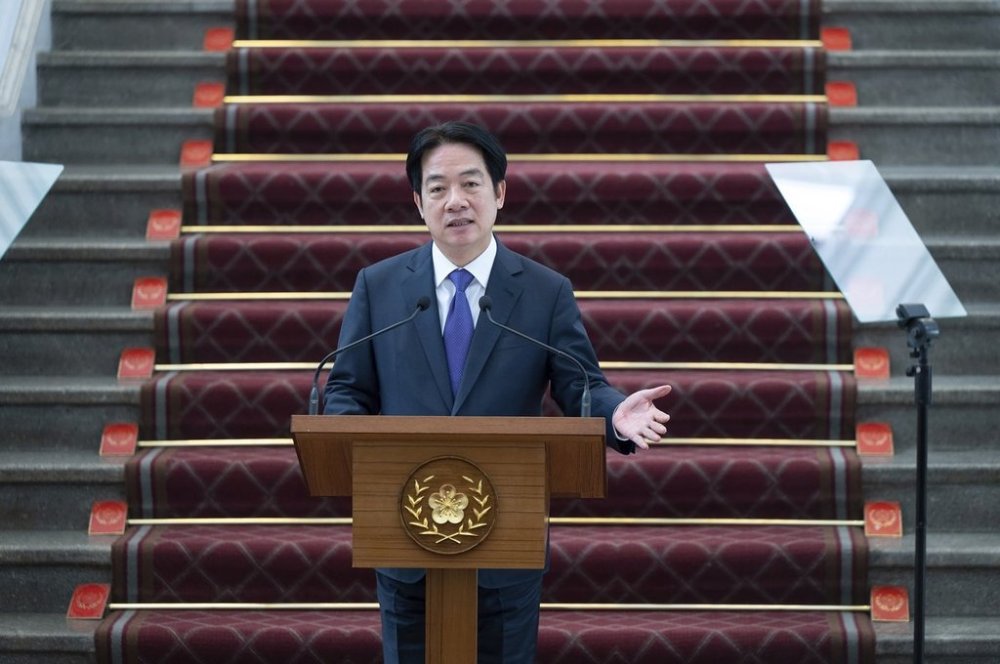Taiwan’s leader says tougher measures needed to counter stepped-up Chinese infiltration and spying
Advertisement
Read this article for free:
or
Already have an account? Log in here »
To continue reading, please subscribe:
Monthly Digital Subscription
$0 for the first 4 weeks*
- Enjoy unlimited reading on winnipegfreepress.com
- Read the E-Edition, our digital replica newspaper
- Access News Break, our award-winning app
- Play interactive puzzles
*No charge for 4 weeks then price increases to the regular rate of $19.95 plus GST every four weeks. Offer available to new and qualified returning subscribers only. Cancel any time.
Monthly Digital Subscription
$4.99/week*
- Enjoy unlimited reading on winnipegfreepress.com
- Read the E-Edition, our digital replica newspaper
- Access News Break, our award-winning app
- Play interactive puzzles
*Billed as $19.95 plus GST every four weeks. Cancel any time.
To continue reading, please subscribe:
Add Free Press access to your Brandon Sun subscription for only an additional
$1 for the first 4 weeks*
*Your next subscription payment will increase by $1.00 and you will be charged $16.99 plus GST for four weeks. After four weeks, your payment will increase to $23.99 plus GST every four weeks.
Read unlimited articles for free today:
or
Already have an account? Log in here »
Hey there, time traveller!
This article was published 13/03/2025 (302 days ago), so information in it may no longer be current.
TAIPEI, Taiwan (AP) — Taiwanese President William Lai Ching-te said Thursday tougher measures are needed to counter stepped-up Chinese infiltration, spying and other efforts to weaken the island’s defenses and speed Beijing’s goal of taking control of the self-governing island republic, a close U.S. partner.
Lai cited a range of recent incidents involving China that fall into a “gray area” including psychological warfare short of open armed conflict.
Beijing’s efforts to “subvert, obtain secrets, lure members of the armed forces and influence public opinion to lose confidence in our national defense require that we step up our legal safeguards to prevent and detect such incidents,” Lai said at a news conference.

Lai said proposed measures to counter China’s moves included bringing back military trials for crimes such as spying and making it more difficult for residents from China and the Chinese territories of Hong Kong, and Macau to obtain Taiwanese identification, a task made more difficult by widespread intermarriage between Taiwanese and Chinese.
Taiwan will also further limit contact with the island by individuals affiliated with the ruling Chinese Communist Party’s United Front department aimed at using cultural products and personnel exchanges to push Beijing’s line on unification.
That followed a case last year when a student on such a delegation sponsored by a pro-unification Taiwanese group used deprecating language toward Taiwan, sparking public anger but with no legal ramifications.
Lai’s Democratic Progressive Party favors the island’s continued de-facto independence from Beijing. China has refused almost all official contact with the DPP since Lai’s predecessor, Tsai Ing-wen, was elected eight years ago.
China regularly sends ships and planes into airspace and waters near the island in an effort to intimidate its 23 million people and wear down its armed forces and morale.
Taiwan’s government recently expelled the Chinese wife of a Taiwanese citizen after the woman repeatedly posted short clips on Chinese social media saying China would conquer Taiwan in half an hour and praising the Chinese leadership.
Such acts are illegal under Taiwan’s laws on aiding and abetting the enemy. The woman, who also held official Chinese titles as a consultant, can apply for residency again in five years.
Other recent incidents have included Taiwanese artists and influencers living in China reposting statements from Chinese state media asserting Chinese sovereignty over Taiwan.
Retired Taiwanese service members have also passed information about the island’s weapons systems to Chinese agents and sought to recruit serving military personnel as spies.
The Defense Ministry on Wednesday confirmed a case where a retired air force major claiming to be working for a U.S. think tank persuaded an air force air intercept controller to hand over classified files in exchange for payment. The retired major, surnamed Shih, delivered the documents to his handlers in China for about $45,000, of which he shared about $6,000 with the serving officer, surnamed Hsu.
The leaked information related to Taiwan’s domestically developed air-launched Hsiung Feng III anti-ship missiles and Taiwan’s response to Chinese incursions into its air defense identification zone.
The two sides separated by the 180-kilometer (110 mile) Taiwan Strait split amid civil war in 1949, and China continues to regard Taiwan as its own territory to be recovered by force if necessary. Lai’s comments came on the 20th anniversary of China’s passage of its Anti-Succession Act, which laid out conditions under which China would invade, including if the island declared formal independence or refused unification indefinitely.
Taiwan’s government says it is already independent for all intents and purposes, and therefore there is no need to make such a declaration, a view embraced by the vast majority of the electorate.
Taiwan has been bulking up its defenses with new missiles and U.S. tanks and planes, along with self-made submarines. It also recently extended the period for mandatory national military service for all men from four months to one year.

